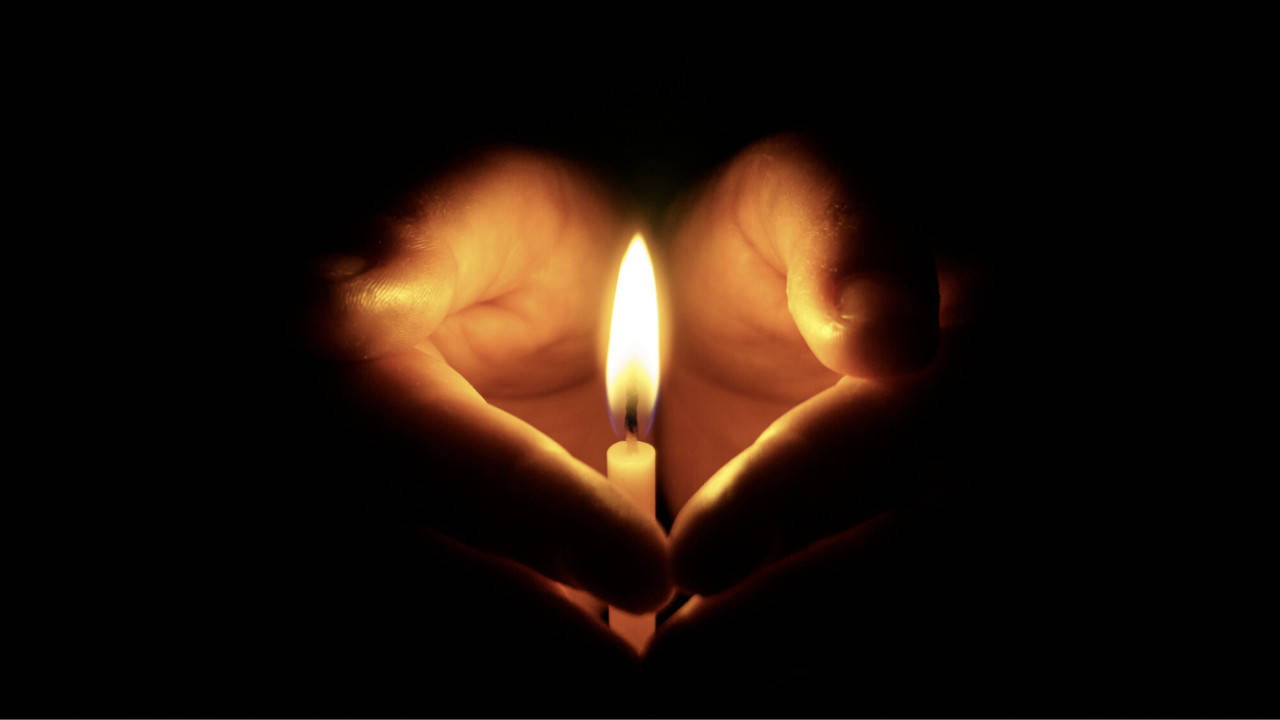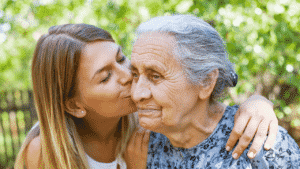Over the past few weeks listeners have been reaching out to me sharing their stories of loss. I’ve heard from several people that their aging parent or their older sister-in-law, or their older cousin died. Some due to coronavirus and others due to dementia, or even a sudden heart attack.
I’ve created this blog post and a two-part podcast series on grief to give affirmation and acknowledgement that there are many of you out there who are grieving. This grief series is my way of honoring you and your loved ones. And to make sure that nobody is alone with grief and bereavement during COVID.
In this article, I answer many of the frequently asked questions I get about grief (including some of the questions recently posed to me by journalists), and I share resources for grief and bereavement support.
My hope with this grief series, is that you feel less alone in your grief during COVID, that you have more courage to face the losses in your life, and that you get support along the way.
What is grief?
Grief is an intense psychological, physiological, and emotional experience that is necessary when adjusting to a major loss (like the death of a loved one, receiving a diagnosis of a life altering medical or mental health condition, losing a home to a fire or foreclosure, etc), and when we move through necessary transitions in life and role changes (like leaving the home for the first time, becoming parents, becoming empty nesters, losing a job, ending a relationship, etc).
Grief is a healthy human experience and a natural response to loss. Our psyche actually needs to experience and process these losses in order to adjust to them in a healthy way.
Grief isn’t something that we can choose to do or not do. Grief is a normal human experience that helps us to process loss, move through transitions in our lives, and integrate all of our experiences. It is painful and it is necessary.
What is bereavement?
Bereavement is a period of mourning after a loss especially after the death of a loved one.
What are the stages of grief?
Grief is as diverse as the people who experience it, but there are common features that are seen with grief. Elisabeth Kubler Ross pioneered this concept of the stages of grief, but what she repeatedly tried to explain was that people don’t move through the stages in order. Grief is messy and disorganized and so is our healing process. Here’s an overview. You can learn more about these stages in her book On Grief and Grieving (I’ll link to it in the list of resources below)
The stages, popularly known by the acronym DABDA, include:
- Denial
- Anger
- Bargaining
- Depression
- Acceptance
How do these stages of grief play out in reality?
Grief is as diverse as the people who experience it. New experiences of grief can drudge up old experiences of grief, compound, and become overwhelming. Simultaneously, that same person may draw on their personal experiences of having moved through grief and be resilient.
Grief is messy, unpredictable, and complex. There is a whirlwind of emotions. Just when we think we have a handle on our emotional state, a song or a smell triggers a memory and we are flooded with emotions.
The Kubler Ross’ stages of grief offer a helpful emotional guide; they give us an emotional language for talking about grief and loss.
These stages help us to normalize grief, but Kubler Ross, herself, made many statements and even wrote that these stages are not linear, we don’t move through them in a neat and tidy line.
These emotional stages are part of a whirlwind of emotions. The gift of these stages, however, is that they normalize the emotional experience of processing grief and they let us know that we are not alone. They say, “it’s ok to be angry”, “it’s expected that you are going to bargain and plead for more chances” or “wish that you had made a different decision that would alter fate and prevent a loss from happening”. They say, it’s human and normal to deny that the person is going or gone. The stages help to name our experience, because naming our experience and giving voice to it, helps us to integrate losses into our psyche, which is what we need in order to heal and grow
What about “additional stages,” particularly David Kessler’s sixth stage of grief?
David Kessler’s sixth stage of grief is really important. In a recent podcast with Brene Brown, Kessler explained that finding meaning when we’re grieving is important but that it is not a bypass to the pain. Kessler cautioned, if we don’t experience the pain associated with loss, we cannot heal it. Meaning provides a cushion, but doesn’t take the place of the pain. He also clarifies that there is no meaning in the loss or the death itself, the meaning is what we do after the person dies (or the loss), the meaning lies within us, not in the loss.
Kessler and Kubler Ross worked together. It’s important to know that this 6th stage of Finding Meaning is an addition to the other stages of grief and loss, it does not take the place of them.
What is disenfranchised grief?
During the Coronavirus Pandemic, we’re not able to grieve and mourn with our typical traditions. And when we aren’t able to grieve and mourn with their natural and typical traditions or rituals, it might keep us from actually engaging in our bereavement and mourning process. This has the risk of creating what’s called disenfranchised grief. I
To disenfranchise means to deprive someone of a privilege or a right. Disenfranchised grief is to deny someone of a privilege or their right to grieve. And here’s how it’s playing out during the Coronavirus pandemic. People are denied the right to mourn publicly. The ceremony where we come together, as a community, and remember the person and tell stories about how they influenced our lives has been taken away from us.
When the bereaved’s suffering is not acknowledged or affirmed and when there is no forum to honor the memory of the person who has died, or how significant the loss is, the needs of the person who is grieving don’t get met. They’re denied or deprived the privilege of grieving, they’re denied the privilege of mourning. This is disenfranchisement. This is disenfranchised grief.
I don’t want you to experience disenfranchised grief because when you do, there’s an increased risk of mental health concerns like depression, anxiety or substance use. And this adds to the suffering.
This is exactly why I’ve created this series on grief during COVID, because I want to honor you and your love ones in your bereavement process.
What is postponed grief?
When we don’t take the time to grieve and postpone it by avoiding (common avoidance strategies are over drinking, overeating, isolating) we run the risk of having problems down the road. The term for this is postponed grief. The difficulty is that postponing the grief doesn’t allow you to work through it, it only puts the grief off for later. And, once you arrive at a place where you can process it and are ready to consciously grieve, others may have processed the grief and be at a new place in their lives, potentially leaving you without as much support.
What can I do if I’m grieving?
We don’t get to dictate how we grieve. Grieving happens on both an unconscious and conscious level. It simply happens. We don’t get to say, I’ve moved through “denial”, now I am in the in the stage of “anger”. Or, “I’m experiencing depression, so that means I’m on my way to acceptance and then I’m done.” Grief doesn’t work like that. To actually move through the grieving process, we have to experience the pain and suffering associated with grief.
The timeline is unclear. It used to be thought that the person should have moved out of their intense bereavement process (grieving after the loss) within 6 months to a year. But, that isn’t true. Fragments of grief may exist throughout our lives.
Here are some strategies for helping you move through grief during COVID.
- Acknowledge that you’re grieving. Giving words and voice to the grieving process helps in the healing process. It helps to bring the unconscious into the conscious (kind of like turning on a light in a dark room). Allow yourself to look and reflect.
- Share your grief with others. Acknowledging your own grief and sharing it with others allows you to get the support you need. Grief is too big to hold on our own, which is why every society and culture has a tradition for bereavement and mourning that typically includes rituals and events with community and family. Rituals, community, and family events create opportunities for our grief and bereavement to be witnessed, held, and understood. It creates a sense of belonging, which helps to stabilize us when our foundation is unstable.
- Don’t downplay or dismiss your pain and suffering. Pain and suffering is just that- painful and one of our natural human tendencies is to push it away. Allow yourself to experience the pain and TALK about the pain.
- Engage in self-compassion. Hold your pain and suffering gently and with compassion. Be kind to yourself and be encouraging. Refrain from judging yourself or others. One of the things that I share with my bereaved clients is “this is hard and you will get through this… I’ll be with you every step of the way”
- Try to maintain your physical health. You may notice sleep disruptions, loss of appetite and other physical changes. Do your best to maintain your physical health.
- Even though you have to distance yourself during COVID, DO NOT isolate. Reach out to others for support. Stay connected to others by forging new bonds or strengthening the bonds you have
- Join a grief or bereavement group. Groups can help to hold space for our suffering, remind us that we are not alone, and help us to bear witness to others and allows others to see us. I’ve linked to a couple of resources below.
I have a friend who’s grieving. What can I do to support them and reduce the risk of disenfranchised grief?
- Reach out to your friend and acknowledge that their loved one has passed. Talk about the importance of the loss.
- Share your own memories of the person and your relationship with them. You could do this by recording a simple video on your phone and texting it.
- Or write a few stories of your memories of the person and mail these memories in a card.
Recommendations and Resources
Recent articles on grief that I was featured in:
- Fatherly article: That COVID Feeling? Its Called Anticipatory Grief
- Insider article: What are the Stages of Grief? How to Process and Deal with Grief and Loss.
Recommended reading:
- Elisabeth Kubler Ross and David Kessler’s book On Grief and Grieving: Finding the Meaning of Grief Through the Five Stages of Loss
- David Kessler’s Book Finding Meaning: The Sixth Stage of Grief.
- The Art of Dying Well by Katy Butler
Recommended Listening
- My podcast on Grief During COVID Part 1: Anticipatory Grief and Ambiguous Loss
- My podcast on Grief During COVID Part 2: Forced to Grieve Without a Funeral
- Brene Brown’s podcast interview with David Kessler On Grief and Finding Meaning
Join a Grief Group
Many grief groups are still running during the COVID Pandemic. Look for a grief group near you here:
Please get professional support when you need it.
New losses can bring up old losses. New trauma can bring up old trauma. If you find that you are struggling and are engaging in unhealthy behaviors, or are falling into deep despair and depression, intense anxiety, or having thoughts of suicide, please reach out for mental health care. Most mental health providers are currently providing tele-mental health. Please reach out and find a provider if you need one. Here’s where:
- Psychology Today: https://www.psychologytoday.com/us
- National Suicide Prevention Hotline 1-800-273-8255: https://suicidepreventionlifeline.org/



